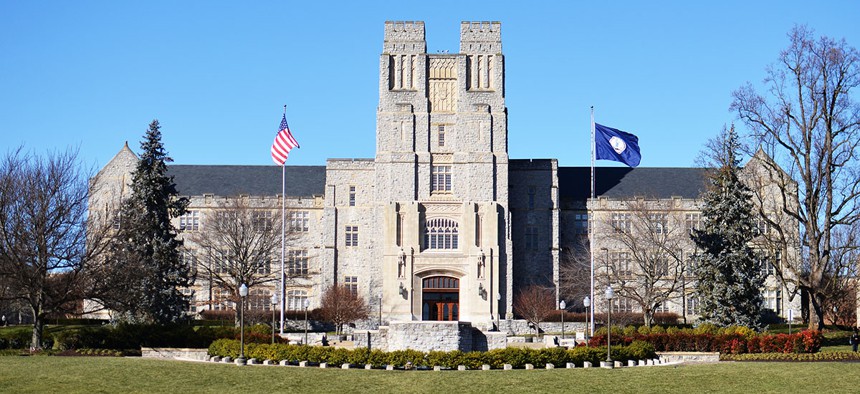Researcher Says Government Cyberthreat Sharing Too Secretive

Burruss Hall on the Virginia Tech campus Rui Serra Maia/Shutterstock.com
The university's attack space includes power generation networks, campus police databases, research files, student records and retail payment systems, among other sensitive digital operations.
The top cybersecurity official at one of the country's foremost scientific institutions says the federal government is too secretive about the threat tips it shares.
Virginia Tech is no stranger to hackers. Randy Marchany, the school's chief information security officer, says he assumes the attackers are already inside its networks. The university's attack space includes power generation networks, campus police databases, research files, student records and retail payment systems, among other sensitive digital operations, he said.
"I’m not the CISO of a university; I’m the CISO of a small town," said the nearly 40-year information security veteran at a cybersecurity conference Tuesday.
Marchany lamented what he says has been a growing trend during the last couple of years of the government restricting information about ongoing hack campaigns -- information that could help his staff identify the suspicious activity they already glimpse on systems.
"The federal government now has this tendency to try to put a classified label on everything, and so I have to sometimes go to a dark room and have people hand me information" that I can only look at, he said.
Marchany said, at one meeting, he said aloud a list of malicious IP addresses traced back to China. His colleague motioned him to stop talking by drawing a hand across his neck in a throat-cutting gesture, Marchany said.
"Throwing a wide open net over everything, in a way, hinders my ability to a) get the information from you and b) to be able to disseminate that to my peers in the education world," he said.
"Having said that, the information that we do get turns out to be really, really valuable in helping us correlate something" unusual witnessed on a network, because "usually, we see it before you do," Marchany told the audience of 162 mostly government and contractor employees at the summit, which was hosted by the Association for Federal Information Resources Management and U.S. Cyber Challenge. "We're the real world."
According to the Obama administration, the government’s Cyber Information Sharing and Collaboration Program has provided 28,000 indicators of malicious activity to the private sector since 2011. In 2014, Roberta Stempfley, then-Department of Homeland Security acting assistant secretary of cybersecurity and communications, said the indicators are "generally" unclassified.
From 2006 to 2013, 550 universities reported some kind of data breach, NBC News reported last September.
Virginia Tech suffered a breach in August 2013, when an intruder hacked a human resources computer server containing sensitive data on 145,000 job applicants, along with license plate numbers for 16,600 of those individuals. The forms that were compromised asked applicants to indicate their professional licenses and certificates.
"Have we been breached? Yes, we’ve been breached," Marchany acknowledged.
Today, reports of a new data breach at a university somewhere in the world are published almost weekly.
In late February, the University of California, Berkeley announced a hack into a school financial system that compromised the Social Security or bank account numbers of about 80,000 students, alumni and vendors.
For more than two years, suspected Chinese and other nation state hackers nestled inside computers at Penn State's engineering school, which happens to develop sensitive technology for the Navy, Bloomberg reported in May 2015.






